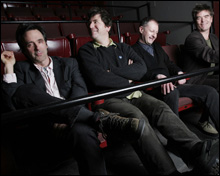
KEEPING IT REAL: “Our notoriety far exceeds our popular. acceptance,” jokes Roger Miller.
|
If back in 2001 you’d told me or just about any other right-minded music fan that the legendary Mission of Burma would have two new studio albums to their name within five years, the polite response would have been, “Yeah, right.” But Burma are back with their second reunion album, The Obliterati (Matador). Sure, it was a long time coming. But they’re once again a functioning band.“Isn’t that the truth?” says bassist Clint Conley over the phone, speaking in a half-serious world-weary voice. “Here we go again. I’m sick of myself. I’m bored with my own story. We’re sick of our own damn selves.”
“There is that thought,” says guitarist Roger Miller in a separate conversation, “of people vaguely disgruntled by the bustle of Burma activity in the 21st century. But if we waited another 20 years, we’d all be in our 70s.” On a more serious note, Miller admits “it was weird when we re-formed. Now, you kind of get used to it, and that’s a plus and a minus. It gives you incredible credibility and clout, but it suggests you’re not the ‘now’ thing. But we’ve stuck to our guns, our credibility, and our integrity. Our notoriety far exceeds our popular acceptance.”
“It tends to sound so trumped up,” says drummer Peter Prescott of the hype. “I wouldn’t blame some young kids going, ‘Oh, they’re some old band people are jerking off about.’ ” He laughs. “We will go away. It’s inevitable. Everything does. Being back together is based on some kind of weird midlife craziness that happens to be really synchronistic.”
And what band from 1979 would you rather have rattling your ears and stimulating your brain in much the same way they used to? Burma were one of the key outfits on the art-punk wing of a diverse Boston scene. With Martin Swope as their tape manipulator, they recorded some classic tracks for Rick Harte’s Ace of Hearts label. Then, just as they seemed to be hitting their peak, they called it quits, in large part because of Miller’s tinnitus. Their final Boston show, a sold-out affair at the long-gone Bradford Ballroom (now the Roxy), was their biggest headlining gig ever. They seemed destined to be one of rock’s great tragic losses. Conley left music altogether to become a Chronicle producer. Miller pursued quieter keyboard projects and later joined the silent-film-scoring unit the Alloy Orchestra. Prescott led various noise parades and psychedelic barrages — Volcano Suns, Kustomized, the Peer Group. And as covers of their better known songs proliferated, the legend of Burma grew.
So when a tentative reunion turned into the real thing in 2001, it was big news. They were inspired enough to pull together a full album of new songs, 2004’s ONoffON (Matador). And the touring began: festival dates, batches of gigs here and there.
With The Obliterati, Burma continue to do what they’ve always done best. It’s an oddly melodic sort of racket, where muted vocals and lyrical non sequiturs do battle with inventive guitar leads, plunging bass lines, and thunderous drums. They plant sonic land mines in surprising places. Calm and repetition mutate into cacophonous skronk. Often there seems to be no lead instrumentalist. Songwriting credits are divvied per usual: Miller has six, Conley five, Prescott three.